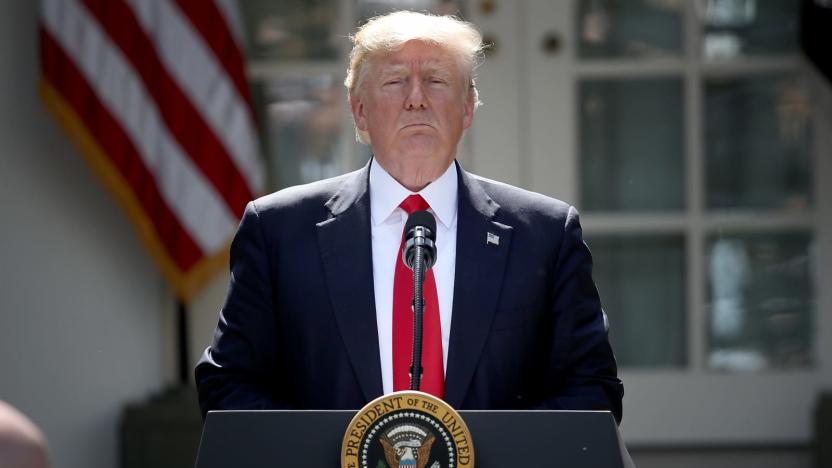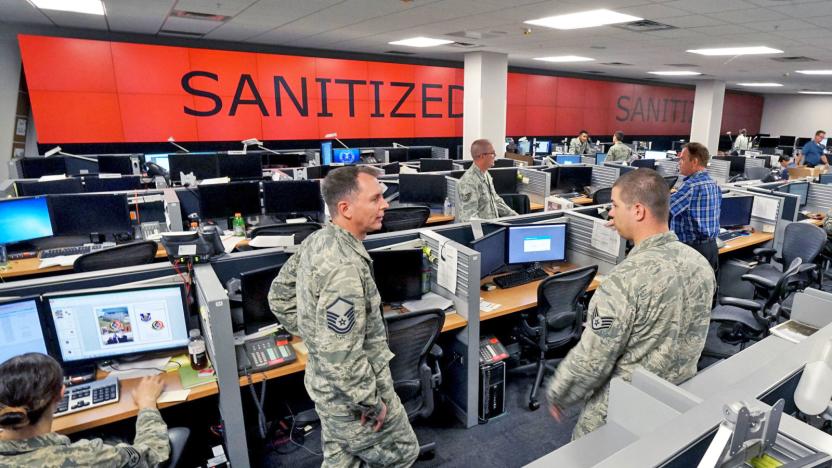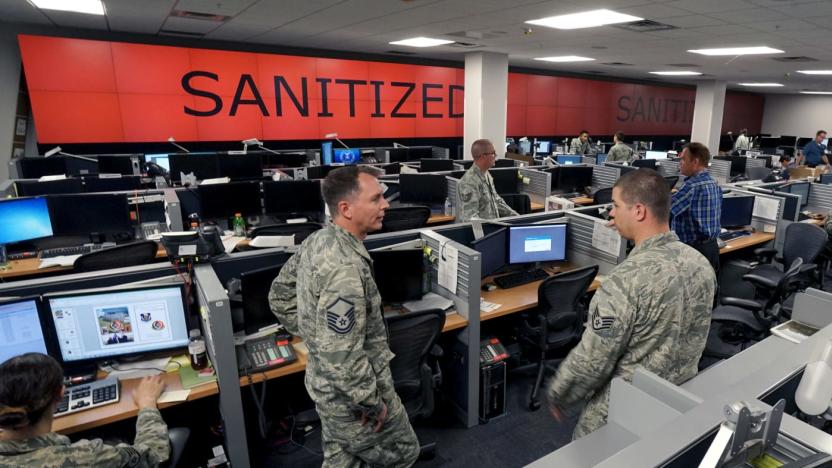cybercommand
Latest

US targets individual Russians in fight against election interference
The US isn't limited to fighting election interference campaigns on its own soil. The New York Times has learned that Cyber Command is conducting the country's first known overseas operation to protect American voting against online meddling. The initiative reportedly entails deterring individual Russian operatives spreading disinformation by making it clear that US agents are tracking their activity. In theory, this will force the Russians to change their behavior without prompting an escalation that could lead to power grid attacks and other much more serious campaigns.

US elevates the role of Cyber Command
After months of talk and planning, US Cyber Command is now just as important as the rest of the Pentagon's commands -- at least, on paper. The military has officially elevated its cyberwarfare division to a "unified command" that operates independently of the NSA. It's not a complete split. General Paul Nakasone (shown above) will run both Cyber Command and the NSA, replacing Admiral Michael Rogers.

Trump announces he’s elevating the role of US Cyber Command
In a statement today, President Trump announced that he's elevating the US Cyber Command to a unified combatant command, bringing it the level of others like the US European Command and the US Special Operations Command. "This new Unified Combatant Command will strengthen our cyberspace operations and create more opportunities to improve our Nation's defense," said Trump. "The elevation of United States Cyber Command demonstrates our increased resolve against cyberspace threats and will help reassure our allies and partners and deter our adversaries."

US Cyber Command may be splitting off from the NSA
It sounds as though the United States' Cyber Command will break off from the National Security Agency and be more aligned with the military in the future. The move would "eventually" cleave Cyber Command from the intelligence-focused NSA and instead align it more with the military, according to the Associated Press. "The goal is to give Cyber Command more autonomy, freeing it from any constraints that stem from working alongside the NSA," AP reports. The NSA's core task of intelligence gathering sometimes is at odds with military cyber warfare operations, hence the proposed separation. Prior to this, the two had clashed on getting intel from Islamic State networks (the NSA's task) and attacking (Cyber Command's).

The US military might let its IT warriors skip boot camp
The commander of US Cyber Command (US CYBERCOM) told the Senate Armed Services Committee today that they're having difficulty raising a number of "cyber-warriors." They're in such a hurry to field a force of information technology- and digital security-trained soldiers that they're considering letting them skip boot camp. If America is to sally forth into the future with its arsenal of digital weapons, it desperately needs personnel to wield them.

US reportedly elevates the role of Cyber Command
Now that the US treats cyberwarfare as a staple of its combat operations, it's ready to raise the prominence of its internet warriors. Reuters sources say that the Obama administration is planning to elevate Cyber Command, turning it into a "unified command" that's just as crucial as a major regional section like Pacific Command. The proposed shuffle would also detach Cyber Command from the NSA, giving it more input on the use of online weapons and defenses.

US launches its first cyberattacks against ISIS
The US no longer thinks that it's enough to hurt ISIS through airstrikes and cutting off propaganda channels -- it's starting a full-on digital warfare campaign. Cyber Command is launching its first attacks against ISIS' digital infrastructure in a bid to disrupt its communications and other basic functions. According to New York Times sources, this includes everything from imitating commanders to interrupting payments to fighters. This, in turn, could slow down ISIS as it second-guesses its moves for fear of being led into an American trap.

The military is taking cyber warfare a lot more seriously
Following the rather embarrassing revelation that the Pentagon has no idea who'd be in charge in the event of a cyber attack comes word that the military is stepping up its cyber warfare game. So much so that cyber is joining the ranks of other combatant commands like those dedicated to specific regions (Pacific, Europe, Africa, Middle East) and those focusing on spec-ops, transportation and nuclear forces, according to Defense One. Currently, cyber warfare sits as a "sub-unified command" under the U.S. Strategic Command and this move would apparently make the group faster and aid in more successful missions.

US reportedly planning to scare off China's hackers, somehow
So how will the US government respond to a recent spate of attacks by hackers, including one that extracted an unprecedented amount of data on government employees from the Office of Personnel Management (OPM)? The LA Times and New York Times suggest the Obama administration has decided it must retaliate against China, which is believed to be behind the attacks, but is still working out how to do it. Comments from government officials like Director of National Intelligence James Clapper have highlighted "deterrence" as an ideal outcome, but how?

U.S. Department of Defense preps cyber rules of engagement, plans to work more closely with ISPs
The Pentagon left no room for argument last year when it declared cyber attacks a potential act of war. "If you shut down our power grid, maybe we will put a missile down one of your smokestacks," a military official reportedly remarked. Yikes. Before we start bombing chimneys, however, the Department of Defense plans to draft up some relevant guidelines, noting in a recent House Armed Services Committee hearing that it will be delivering a set of cyberspace-specific rules of engagement in the coming months. "We are working closely with the joint staff on the implementation of a transitional command and control model for cyberspace operations," said Madelyn Creedon, assistant secretary of defense for Global Strategic Affairs. In addition to setting ground rules for cyber-engagements, the DOD also plans to expand efforts to share classified information on possible threats with internet service providers and defense contractors.

US Cyber Command achieves 'full operational capability,' international cyberbullies be warned
A sword, a lightning bolt, a key, a globe, and a bird. These are the symbols of your United States Cyber Command, which you'll be proud to know has "achieved full operational capability." FOC is when a military organization basically has what it needs and knows how to use it, but we're guessing our new cyber-commandos will be a little nervous at first, like a prom date just presented with a room key, or a Modern Warfare player with a new weapon attachment. Surely the USCC will get into its stride real soon, enabling it to "operate and defend our networks effectively." You know what that means: feel free to be a little extra offensive when trolling on foreign soil today. Uncle Sam has your back.

Thumb drive-based malware attack led to formation of US Cyber Command
Recently declassified documents have revealed that the worst breach of U.S. military computers evar went down in 2008, a major turning point in our nation's cyberstrategy that eventually led to the formation of the United States Cyber Command. Operation Buckshot Yankee, as the defense came to be known, began when a USB thumb drive infected by a foreign intelligence agency was found in the parking lot of a Department of Defense facility in the Middle East. Whomever found the thing placed it in their laptop (probably hoping to find Justin Bieber MP3s), which just so happened to be attached to United States Central Command. From that point, writes Deputy Defense Secretary William J. Lynn in Foreign Affairs, malware spread "undetected on both classified and unclassified systems, establishing what amounted to a digital beachhead, from which data could be transferred to servers under foreign control." Yikes! We still haven't found out which country orchestrated the attack, or what they might have learned from it, so until the Pentagon tells us otherwise we're going to do what we usually do in these situations and blame Canada (sorry, Don). [Warning: read link requires subscription]

Congressional record states the iPad is "wonderful"
In giving testimony at a Congressional hearing as to whether he will lead the U.S. Cyber Command, Lieutenant General Keith B. Alexander, current Director of the NSA, mentioned that he owned an iPad. Is that relevant to his his future role of defending America from cyber terrorists? Nope. But how cool is it that the freakin' Director of the NSA loves his iPad so much he brings it up at a Congressional hearing, unprompted? Pretty damn cool. As a matter of fact, when the Lieutenant General brought up that he had an iPad, national security took a slight sideline when a congressman returned to the subject of the iPad moments later. According to the actual Congressional Record: Congressman: I'm tempted to get a critical review of the iPad, but perhaps we can do that-- Director of the NSA: [It's] Wonderful. Congressman: "Wonderful." I will put that on -- for the record. So there you go folks: not only is the iPad "magical" and "revolutionary," it's also now officially a "wonderful" device, too.







